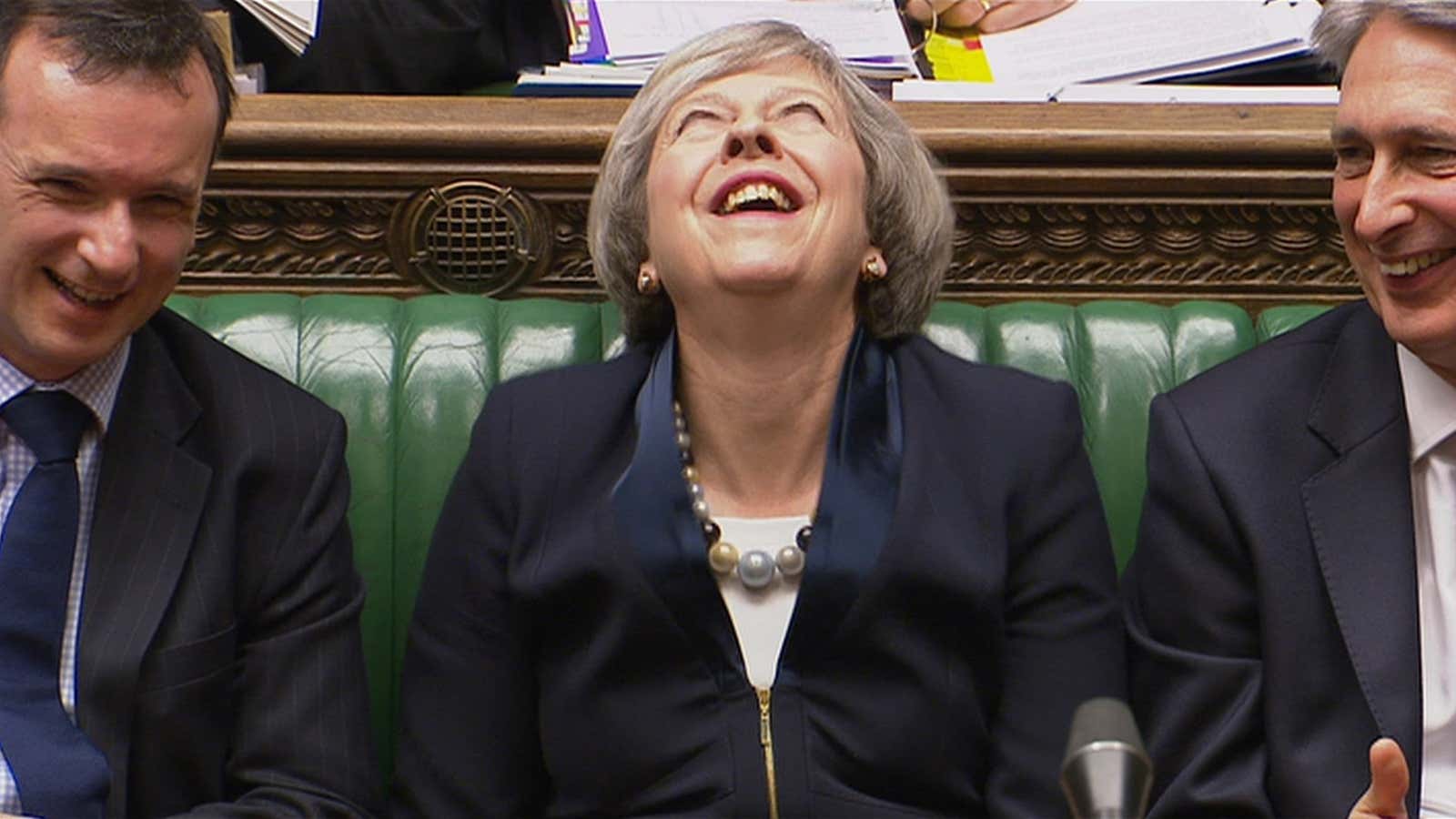Last June, British voters were given a simple choice, to “Remain a member of the European Union” or “Leave the European Union.” A narrow majority opted for the latter, and everything since then has been, frankly, a mess.
Now, with British prime minister Theresa May about to begin Brexit negotiations in earnest, things are about to get even messier.
Legally speaking, the referendum on June 23 was only “advisory.” Although May initially claimed that this was good enough for her to formally start the UK’s divorce proceedings with the EU—officially speaking, to trigger Article 50 of the Lisbon Treaty—the Supreme Court said otherwise. So May was forced to seek parliament’s consent to get Brexit going.
The lower house, the House of Commons, voted through a bill in a jiffy. But the upper house, the House of Lords, resisted. The Lords sent the bill back with amendments: one to ensure EU citizens living in the UK would maintain their rights and another to give parliament a “meaningful vote” on the final terms of exit that May’s government agrees with the EU.
The Commons, where May’s Conservative Party has a majority, rejected those amendments yesterday and told the Lords to reconsider. The Lords could’ve added the amendments back, engaging in a game of legislative ping pong, but the unelected upper house decided to defer to their more powerful, elected counterparts. So the Brexit Bill passed the Lords without amendments.
Now, May can trigger Article 50 when she wants, likely towards the end of this month. Sidelining parliament on this decision removes an important hurdle to Brexit, but many other legal and political obstacles remain.
Scotland’s second independence referendum
Scotland’s first minister Nicola Sturgeon threw a spanner into May’s plans yesterday by announcing that Scotland will seek another referendum on independence from the UK, explicitly tied to the exit deal the prime minister negotiates with the EU.
Scotland voted on independence in 2014, and 55% of voters opted to remain part of the UK. However, Sturgeon said, “the future of the UK looks very different today than it did two years ago.” In the Brexit referendum, 62% of Scots voted to remain part of the EU.
Sturgeon needs the British parliament’s approval to hold a second independence referendum. May has made it clear that she isn’t interested in allowing another vote on Scottish independence, and has plenty of legal leverage over Sturgeon. But the Scottish leader’s move complicates May’s negotiations with Brussels—the worse that the talks go, the more likely a restive, pro-EU Scotland will push for independence.
The multibillion-euro divorce bill
EU members must contribute to the union’s shared budget each year. That annual sum for the UK has ranged from €7 billion to €14 billion ($7.5 billion to $15 billion). Member states also own portions of shared assets. Like in any divorce, divvying up these up and calculating future support payments is a fraught process. EU officials say that the UK may have to pay it as much as €60 billion. The UK, meanwhile, says that the EU owes it €10 billion.
There is no legal clarity on this, but already it seems that fighting over the bill could cast a cloud over all the other issues that London and Brussels need to work out between themselves.
The two-year timeline
As soon as a country triggers Article 50, it starts a two-year timer to negotiate divorce terms. May has said that her government will, within those two years, not only sort out those details but also line up a new trade arrangement with the EU, the UK’s biggest trading partner. The EU side thinks that’s unrealistic.
After two years, if there is no agreement on an extension the UK will simply quit the EU with no transitional arrangements or special deals to smooth over the break. Some believe that no deal is better than what they consider a bad deal, but many fear the ramifications of a so-called “hard Brexit.”
Can Brexit be reversed?
May has promised parliament a vote on the final deal that the government secures with the EU. But now that the Brexit bill has been passed without an amendment that requires a “meaningful vote” on the matter, it’s not clear what power parliament has to influence the outcome of the Brexit negotiations.
May has vowed the UK will leave the EU whether or not it agrees a trade deal with the bloc after two years or not. If no deal is made, a welter of tariffs and other trade barriers could make it much more costly for British firms to trade with the EU, putting a big dent in the UK economy.
If it becomes clear that the UK is headed for a hard Brexit, could Article 50 be revoked and Britain remain in the EU? That’s a question that Jolyon Maugham, a London-based lawyer, wants the European Court of Justice to answer.
The trouble is, even if Article 50 can be revoked, the recent passage of the Brexit Bill puts parliament in an awkward position. May’s government has no legal obligation to ask for a “meaningful” vote on the terms of exiting the EU. In effect, parliament’s passage of the Brexit Bill implies that it doesn’t want to ensure it has a say on the negotiations, taking the government’s at its word that it will be consulted at some vague future date.
Still, the parliament remains supreme. If Article 50 is deemed revokable and the parliament can secure a majority against May, any MP should be able to introduce a new bill and force May to stop the Brexit process (how the EU would react to that is anyone’s guess). However unlikely this may seem now, the past year suggests that just about anything can happen.
